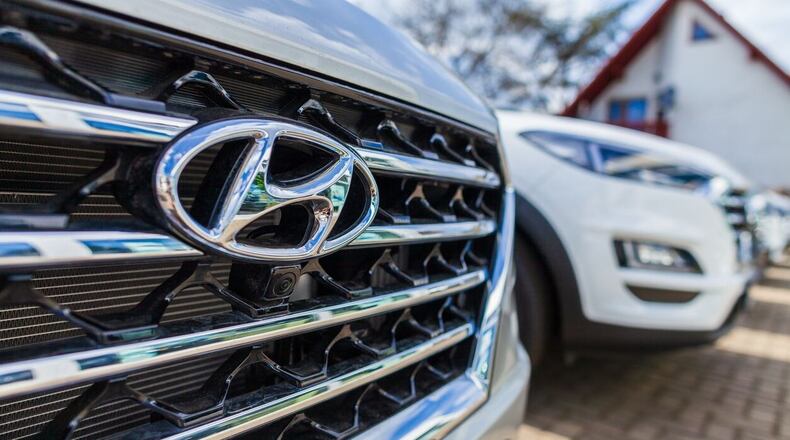Another massive EV battery plant is coming to Georgia.
Hyundai Motor Group and LG Energy Solutions announced plans late Thursday to spend $4.3 billion to build an EV battery manufacturing plant in Bryan County near Savannah as part of the largest economic development project in state history.
The project would be built adjacent to Hyundai’s massive electric vehicle “Metaplant” under construction in Ellabell, and state officials say it would be part of the company’s previously announced plan to spend $5.5 billion on the new complex and create 8,100 jobs.
The South Korean-based companies said Thursday the battery plant would account for 3,000 of those jobs and the batteries made at the forthcoming factory will power Hyundai, Kia and Genesis models produced at U.S. facilities, the companies said in a release.
In a statement, Hyundai Motor chief executive Jaehoon Chang said the company is focusing on efforts to produce electric vehicles in North America and this project would help “create a strong foundation to lead the global EV transition.”
The plant is expected to break ground later this year and will begin battery production toward the end of 2025. Once complete, the facility will be able to build enough batteries annually for 300,000 electric vehicles.
Hyundai is already developing another major battery plant in Georgia. The automaker and a subsidiary of SK Innovation said in December they would build a factory near Cartersville that could total $5 billion in future investment and create 3,500 jobs.
The latest development adds to a spree of EV manufacturing plants and battery facilities that have already opened in Georgia or are heading to the state.
Credit: Stephen B. Morton for The Atlanta Journal Constitution
Credit: Stephen B. Morton for The Atlanta Journal Constitution
Rivian is building a $5 billion EV factory about an hour east of Atlanta. Dozens of parts and materials suppliers are also opening plants in the state to feed the growing EV ecosystem. And state officials say they have a pipeline brimming with other projects they aim to recruit.
The new projects also build on close ties between Georgia and South Korean officials. Gov. Brian Kemp made South Korea the site of his first overseas trade mission in 2019, and U.S. Sen. Jon Ossoff has embarked on two official trips there, including one in April.
Georgia lured the Hyundai plant last year with a package of $1.8 billion in tax breaks and other incentives, shattering the previous state record. It was not immediately clear if any additional inducements were offered to Hyundai and LG to finalize plans for the battery plant.
A green hub
Georgia leaders immediately praised the new plant as a showcase of the strength of the state’s evolving economy, though they differed sharply on what led the firms to pick Georgia.
Ossoff, a Democrat, said the landmark climate and healthcare law that President Joe Biden signed into law last year was key to securing the investment. The law includes billions in investment and production tax credits for EV and battery manufacturers.
“The IRA’s manufacturing incentives continue to bring jobs and investment to Georgia,” Ossoff said, referring to the Inflation Reduction Act. “My goal remains to make Georgia the world leader in advanced energy production.”
Kemp, in Israel this week with a Georgia trade delegation, credited “the strong partnerships carefully built on the state level” with the two firms. He and other state officials said Thursday’s announcement offered the final details of a project that was outlined before the federal tax measure was signed into law.
“This is exactly what we envisioned when Georgia landed the Hyundai Metaplant in May of last year, and this project is the latest milestone in Georgia’s path to becoming the EV capital of the nation,” Kemp said.
Pat Wilson, the state’s top economic development official, said the new details are a result of the South Korean firms “sharpening their pencils on jobs, investment and long term projections based on actual real, on the ground numbers and more accurate market projections.”
Credit: Stephen B. Morton for The Atlanta Journal Constitution
Credit: Stephen B. Morton for The Atlanta Journal Constitution
Georgia officials have recruited a string of massive projects tied to the transition away from fossil fuels, including a major expansion of solar giant Qcells. But they have bickered over the impact of the federal tax and climate measure, which passed Congress without Republican support.
Kemp recently told The Atlanta Journal-Constitution that he supported a repeal of the legislation, which he said should “never have passed to start with.” But he said that Biden should at least tweak regulations to allow Hyundai and other manufacturers with projects underway to benefit from the breaks.
That refers to a provision in the law that would require all EVs to undergo final assembly in North America to qualify for a $7,500 customer tax break. Since Hyundai’s Georgia auto factory won’t be operational until 2025, customers could lose out on the break until then.
“We’ve been trying to bring these high-quality, high-innovation manufacturing jobs back to the United States. That’s what President Biden campaigned on,” Kemp said. “Now he’s penalized those companies, and he’s picking winners and losers with the bill he passed.”
In a recent interview, Ossoff took a different approach. He said both parties should rejoice over clean energy incentives that have made Georgia a magnet for the industry. And he said Hyundai can take advantage of the breaks as soon as it begins production of the vehicles in Georgia.
“Georgia has benefited more than just about any other state in the country from these manufacturing incentives,” Ossoff said. “We should be celebrating that rather than politicizing it, because Georgia’s economic development should be a team sport and not a political contest.”
Keep Reading
The Latest
Featured





